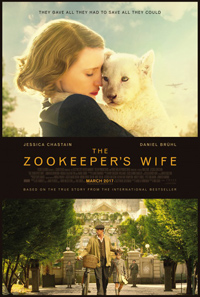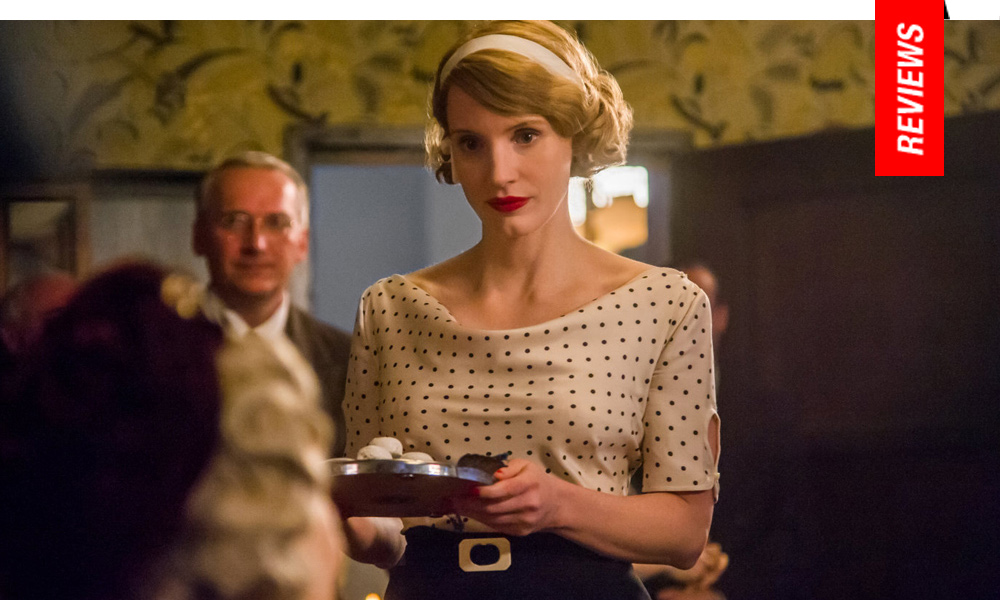Reviews
The Zookeeper’s Wife | Review
My Antonina: Chastain Saves the Day in Glossy Holocaust Drama
 As a byproduct of commodifying historical based cinema, we’ve become numb and desensitized to depictions of the Holocaust, to the point where it seems we’re unable to see where the necessity of remembrance can be extrapolated from either exploitation or glossy revisionism when it comes to reenacting the period, no matter the extreme better serving the purpose of the narrative. Additionally, English language films continue to handicap contemporary considerations of WWII by insistently portraying various European people and places sans their mother tongue or cultural markers, which only adds a sense of estrangement and displacement to something specific to religion, race, and place. Initially, it seems Niki Caro’s The Zookeeper’s Wife, a film adaptation of the popular novel by Diane Ackerman (adapted for the screen by AngelaWorkman), is another one of those glossy, awards friendly contenders, where the suffering of its main characters is kept to a minimal simmer, while most of the atrocious violence happens outside the frame and without conveying the weight of Hitler’s horror. Despite falling into the categorization of the sanitized melodrama, so estranged and enhanced enough from the realities of its actual subject it could be classified as light science fiction, this is also the best project from Caro since her breakout hit Whale Rider (2002), though still similar in scope to her frequent events based films (North Country; McFarland, USA) of the recent past.
As a byproduct of commodifying historical based cinema, we’ve become numb and desensitized to depictions of the Holocaust, to the point where it seems we’re unable to see where the necessity of remembrance can be extrapolated from either exploitation or glossy revisionism when it comes to reenacting the period, no matter the extreme better serving the purpose of the narrative. Additionally, English language films continue to handicap contemporary considerations of WWII by insistently portraying various European people and places sans their mother tongue or cultural markers, which only adds a sense of estrangement and displacement to something specific to religion, race, and place. Initially, it seems Niki Caro’s The Zookeeper’s Wife, a film adaptation of the popular novel by Diane Ackerman (adapted for the screen by AngelaWorkman), is another one of those glossy, awards friendly contenders, where the suffering of its main characters is kept to a minimal simmer, while most of the atrocious violence happens outside the frame and without conveying the weight of Hitler’s horror. Despite falling into the categorization of the sanitized melodrama, so estranged and enhanced enough from the realities of its actual subject it could be classified as light science fiction, this is also the best project from Caro since her breakout hit Whale Rider (2002), though still similar in scope to her frequent events based films (North Country; McFarland, USA) of the recent past.
In the summer of 1939, Warsaw zoo owners Jan and Antonina Zabinski (Johan Heldenbergh and Jessica Chastain) are mostly removed from what’s happening in the world around them. Entertaining guests in their home, including German zoologist Lutz Heck (Daniel Bruhl), who runs the Berlin zoo, they are quickly introduced to different tensions among the revelers. Noting how the Jewish citizens of Warsaw are being ostracized and demeaned, Antonina suggests they pack up and leave, but Jan can’t bring himself to abandon their animals. A decision is made for them when Germany invades, and their zoo is half decimated by bombs. Lutz Heck turns out to be a high ranking Nazi official, but convinces Antonina to give him their most prized breeds before the rest of the zoo is destroyed, but only as safe keeping until after the war ends. As the Zabinski’s contend with Lutz’s own strange plans for the zoo, Antonina and Jan decide to use their home for other purposes, smuggling in Jews from the nearby ghetto, hiding them until they can secure false papers, and delivering them to a safe zone.
Undoubtedly, the emotional resonance of The Zookeeper’s Wife would be zilch if not for a commendable and committed lead performance from Jessica Chastain. Most modern English language adaptations dealing with the Holocaust require the actors to adopt mild British accents to convey their ethnic heritage (The Boy in the Striped Pajamas; The Reader), but Chastain does the next best thing by diving full tilt into a ripe Polish accent. Although this doesn’t allow her to display the mastery of a Streep (Sophie’s Choice, 1982) or a Cotillard (The Immigrant, 2013), Chastain’s approach still recalls a near forgotten aspect of the actor’s craft, even when appearing in subpar material (and for a display of her Irish brogue, let’s not forget The Huntsman: Winter’s War, 2016). Like the flame-haired progeny of a Rhonda Fleming or a Maureen O’Hara, Chastain’s Antonina rises from the mediocrity of The Zookeeper’s Wife with all the prowess of a well-groomed studio star.
Caro captures a lot of masterful sequences with Chastain and the animals, including an early birthing sequence of an elephant, and some cuddles with baby felines and housebroken monkeys. Still, the only real carnage we tend to witness is the murder of these furred creatures when bombs decimate a large portion of the zoo upon the invasion of Poland. When we leave behind the plight of the mammals is where The Zookeeper’s Wife begins to feel a titch antediluvian. As Chastain wards off the rather feeble advances of the nasty-ish zoologist played by Daniel Bruhl (who seems much more excited about playing eugenics with animal DNA), the subdued tension feels more soapy than sadistic, but it at least allows for some believable interplay between Antonina and the increasingly jealous Jan (played with subtlety by Belgian actor Johan Heldenbergh, of The Broken Circle Breakdown).
While Bruhl almost seems to be sleepwalking through another vaguely attenuated villainous performance, all factors seem to be calibrated to enhance the near saintliness of Antonina Zabinski. And if Caro manages to efficiently build tension in the final third of the film, several moments of blatant manipulation tend to ruin whatever anxiety was established (such as a particularly silly off-screen moment of violence used to maximize a clichéd showdown). More comparably subtle moments elicit the kind of discomfort Caro doesn’t land often enough, such as ashes floating through the zoo while the Warsaw ghetto is burned to the ground, a moment ruined by Chastain’s child, who shouts with oblivious jubilee, “It’s snowing.”
While for many, The Zookeeper’s Wife sidesteps the sadism usually underlining Holocaust reenactments, it also reeks mightily of the white, heteronormative savior formulation. Its few Jewish characters are thinly drawn, and besides Chastain, the most vibrant supporting characters tend to be the animals. Still, the emotionally generous performance from Chastain assists in gliding through even the roughest patches of Caro’s latest, which also highlights the Warsaw Zoo, an establishment which still stands (and looks much the same) today.
Production wise, everything is handsomely attenuated, including the set decoration by Charlotte Watts and production design by Suze Davies (with Prague standing in for Warsaw, a city which was mostly decimated by Hitler). DP Andrij Parekh (Blue Valentine) captures the period, though the visual details of the film are generally at odds with a syrupy score from Harry Gregson-Williams. The actions of the Zabinski’s (which resulted in saving the lives of 300 Polish Jews) are certainly heroic, but The Zookeeper’s Wife stops short of being the depiction of their lives or the period it should be.
★★★/☆☆☆☆☆
Los Angeles based Nicholas Bell is IONCINEMA.com's Chief Film Critic and covers film festivals such as Sundance, Berlin, Cannes and TIFF. He is part of the critic groups on Rotten Tomatoes, The Los Angeles Film Critics Association (LAFCA), the Online Film Critics Society (OFCS) and GALECA. His top 3 for 2021: France (Bruno Dumont), Passing (Rebecca Hall) and Nightmare Alley (Guillermo Del Toro). He was a jury member at the 2019 Cleveland International Film Festival.


























